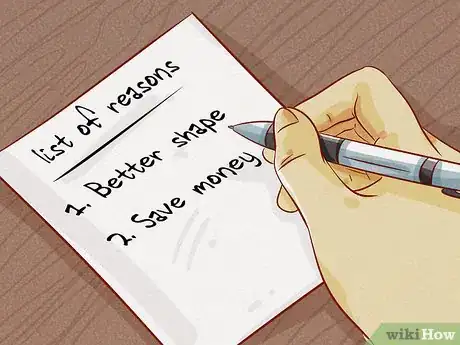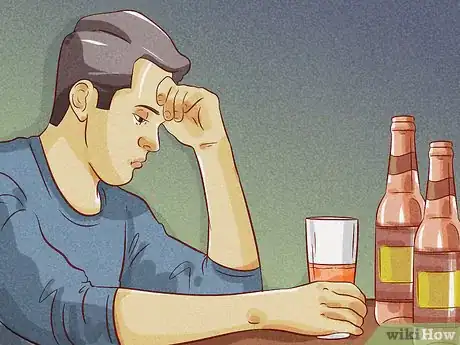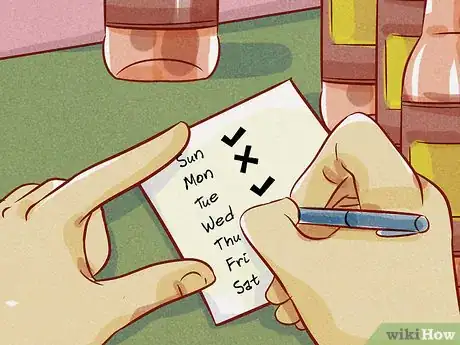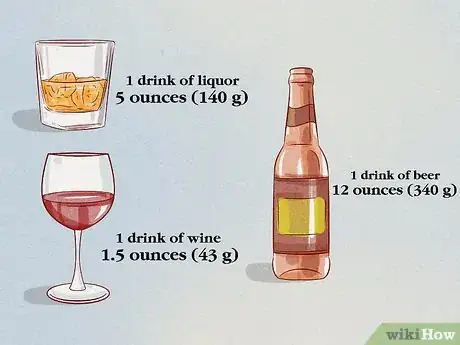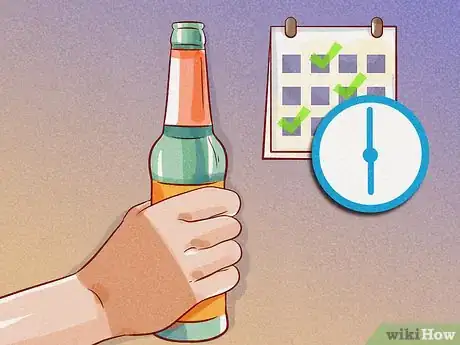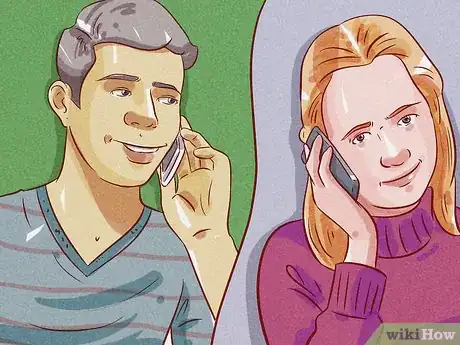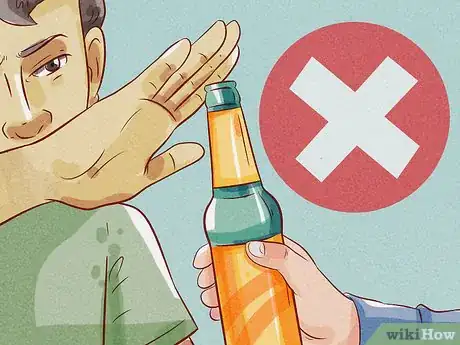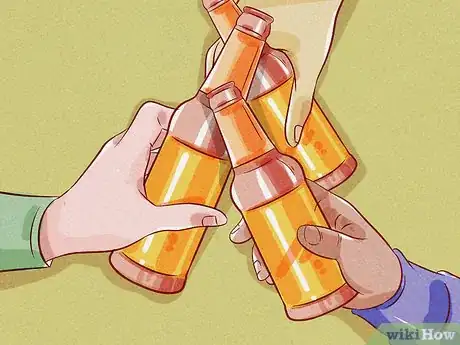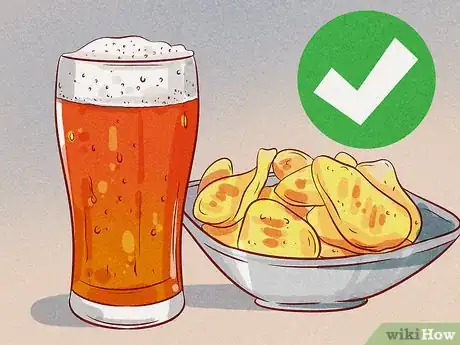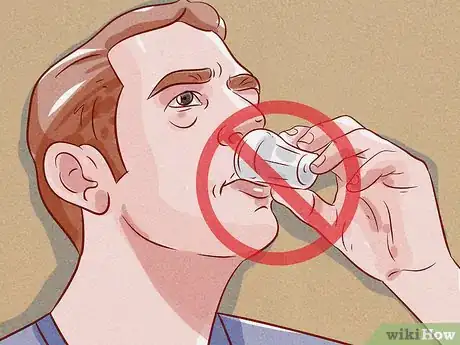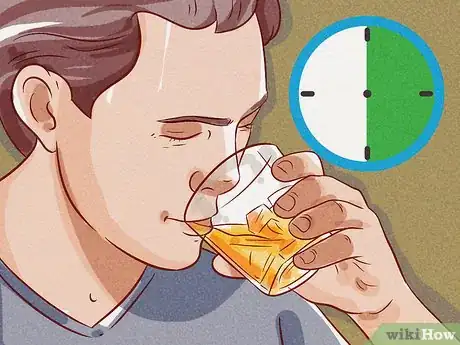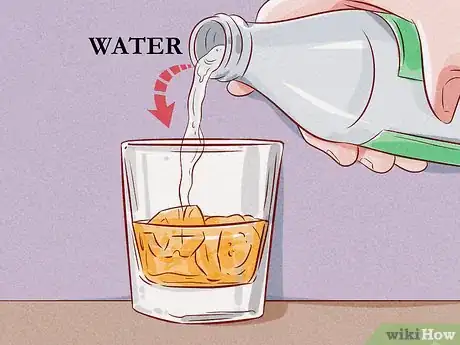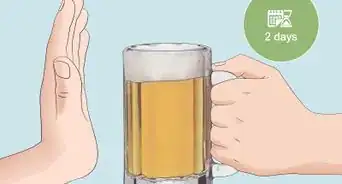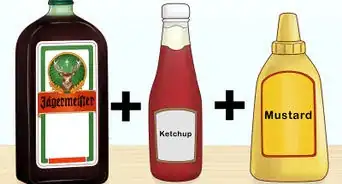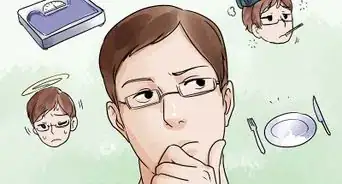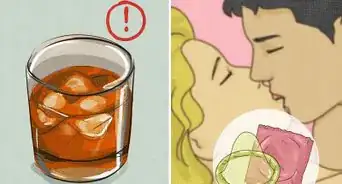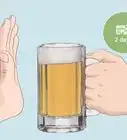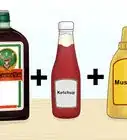This article was co-authored by wikiHow Staff. Our trained team of editors and researchers validate articles for accuracy and comprehensiveness. wikiHow's Content Management Team carefully monitors the work from our editorial staff to ensure that each article is backed by trusted research and meets our high quality standards.
This article has been viewed 15,179 times.
Learn more...
A lot of people decide to start drinking in moderation for many different reasons. Perhaps you want to spend less money, reduce the chances of over-imbibing, or get in better shape. Whatever the reason, there are a lot of great tips to help you change your habits and cut back on your drinking. Start being mindful of your current drinking habits and identify any triggers that make you want to drink. Then come up with a plan for your own drinking guidelines to help pace your drinking, stay hydrated, and stop before you’ve had too much.
Steps
Identifying and Changing Habits
-
1Write down a list of reasons to cut back on drinking. If you’ve decided you’d like to start drinking less, it can be really helpful to put your intentions down on paper. Perhaps you want to get in better shape, save money, or are concerned about the quantity or frequency with which you’ve been drinking. Whatever your reasons, write them down on a piece of paper and keep it with you at all times.[1]
- Putting the list in your wallet will remind you of your intentions every time you go to pay for a drink. Or take a photo of your list and make it the background of your phone so you see it often.
-
2Identify how you’re feeling during times you tend to over-drink. These are your “triggers,” and they are helpful to recognize so you can be more mindful of what drives you to drink. When you find yourself craving an alcoholic beverage, stop and take a moment to assess your emotions: are you feeling anxious, tired, or worn down? Perhaps you’re stressed or overwhelmed or sad. You could even be wanting to celebrate something great! There are lots of different reasons why people tend to over-drink.[2]
- Sometimes people over-drink in social situations if they feel uncomfortable, or they may use alcohol to make an awkward or unhappy situation feel a little better. If your drinking is triggered by specific people or situations, take note of that. You may need to avoid those things in the future.
- If you know when you’re triggered to consume more alcohol, you can create a plan to keep yourself on track and meet your moderation goals.
Advertisement -
3Keep track of how much and how often you drink. Sometimes you might not even be aware of just how much you’re drinking. If you’re concerned that you may be over-drinking, try keeping track of a typical week. Make note of every drink you consume on a daily basis for 7 days, and write down where you are when you drink. This practice can give you a great visual of your actual alcohol consumption.[3]
- You could carry a small notebook around with you, or use a “notes” app on your phone to keep a tally.
-
4Measure your drinks when you pour them at home. A free-pour of wine or liquor could actually be a much bigger drink than the standard serving. 1 drink of wine consists of 5 ounces (140 g), 1 drink of beer is 12 ounces (340 g), and 1 drink of liquor on its own or in a cocktail is 1.5 ounces (43 g). If you drink at home, start measuring to see exactly how much alcohol you’re drinking every day.[4]
- Pay attention to the alcohol concentration, too. A higher-percentage drink will affect you more strongly than a lower-percentage one will.
-
5Limit when or how often you drink. When you’re making a plan to cut back on drinking, set limits and goals for yourself.[5] Perhaps you want to drink only on the weekends or never before 6 pm. Perhaps you want to limit yourself to drinking only when you’re with other people. Or maybe you want to cut back on the number of drinks you consume, rather than the frequency.[6]
- Keep in mind that what is right for you might not be right for other people. Everyone has their own limits and boundaries.
-
6Find other activities to do besides drinking. If you drink out of habit, it could be really helpful to find a new activity to do during the times you would normally be drinking.[7] This can help rewire your brain and form new habits.[8]
- For example, if you normally pour yourself a drink when you get home from work every day, try taking a walk or calling a friend instead.
- Think about the things you enjoy doing in your spare time. Reading, writing, volunteering, spending time outdoors, cooking, baking, bowling, playing sports, doing puzzles, and other activities can help take the place of drinking.
-
7Practice saying “no” when others offer you drinks. You don’t need to tell everyone you meet that you’re cutting back on drinking, but you do need to have a few ways to turn down a drink. A simple, “no thanks,” might work with a lot of people. If anyone is particularly pushy about you drinking, you could say something like, “I have an early morning and don’t want to stay out too late,” or “I’m still working on my first drink.”[9]
- If there are people in your life that you have a hard time saying “no” to, you may want to sit down with them and have a conversation about the life change you’re trying to make. Chances are, they’ll be supportive of your decision.[10]
Implementing Moderation Strategies
-
1Decide beforehand how many drinks you’re okay with consuming. According to the Dietary Guidelines for Americans, women who have 1 drink per day and men who have up to 2 drinks per day are moderate drinkers. If you know you’re going out with friends, decide before you leave the house how many drinks you’re okay with consuming over the course of the night. Having a firm number in mind will help you stick to your resolution.[11]
- Even though the Dietary Guidelines for Americans set their “moderate” drinking limitations low, you can set your own limit for what you feel is right for you.
-
2Make it a point to eat something before or while you’re drinking. In general, drinking on an empty stomach is never a good idea. If you’re going out to drink (or even drinking at home), make sure to eat something. If you don’t eat before your first drink, take a break to have some food before having a second one.
- When you have food in your stomach, the alcohol won’t affect you as quickly, making it less likely that you’ll over-imbibe.
-
3Stick to wine, beer, and mixed drinks when you consume alcohol. Choose to drink beverages that you can sip and stretch out over the course of 30 to 60 minutes. This will help you drink moderately and avoid over-consumption. Avoid taking shots, because they’re consumed quickly and make it more likely that you’ll have additional drinks over the next hour.[12]
- Shots can also impair your movements and thinking more quickly than other drinks because the alcohol hits your system all at once.
- Take into account the alcohol-by-volume (ABV) for your drinks. Heavier beers often have higher ABVs, which means they’ll affect you more quickly than a light beer would.
-
4Limit yourself to 1 drink for every 30 to 60 minutes. When you start drinking, make a note of the time. Avoid having multiple drinks in a short period. For men, it’s recommended they drink 1 alcoholic beverage per half hour at a maximum, whereas for women, it’s recommended they drink 1 beverage per hour.
- Avoid gulping your drink. Instead, take small sips and try to enjoy the flavor of your chosen beverage.
- If it’s hard for you to drink slowly, try setting your drink down after each sip.
-
5Spread out your drinks by alternating them with “spacers.” This is a helpful way to stay hydrated while you’re drinking or to simply give yourself some space to check in on how your body is feeling. Alternate each alcoholic drink with a glass of water or some other kind of non-alcoholic beverage.[13]
- This is a good way to pace yourself if you know you’re going to be out for a long time.
-
6Cease drinking after several hours to keep from over-imbibing. You don’t have to go home if you’re out drinking somewhere, but do set a time for when you’ll order your last drink. Similarly, if you’re at home, have a marker for when you want to stop drinking. This will help lower your blood alcohol content (BAC) and prevent you from getting too dehydrated. Setting limitations for yourself is the best way to drink in moderation.
- This will also help you save money, as you won’t be ordering drinks all night long.
References
- ↑ https://www.rethinkingdrinking.niaaa.nih.gov/Thinking-about-a-change/Strategies-for-cutting-down/Tips-To-Try.aspx
- ↑ https://www.rethinkingdrinking.niaaa.nih.gov/Thinking-about-a-change/Strategies-for-cutting-down/Tips-To-Try.aspx
- ↑ https://www.rethinkingdrinking.niaaa.nih.gov/Thinking-about-a-change/Strategies-for-cutting-down/Tips-To-Try.aspx
- ↑ https://www.rethinkingdrinking.niaaa.nih.gov/Thinking-about-a-change/Strategies-for-cutting-down/Tips-To-Try.aspx
- ↑ Mental Health America. Non-Profit Organization. Expert Interview.
- ↑ https://www.rethinkingdrinking.niaaa.nih.gov/Thinking-about-a-change/Strategies-for-cutting-down/Tips-To-Try.aspx
- ↑ Mental Health America. Non-Profit Organization. Expert Interview.
- ↑ https://www.rethinkingdrinking.niaaa.nih.gov/Thinking-about-a-change/Strategies-for-cutting-down/Tips-To-Try.aspx
- ↑ https://www.verywellmind.com/tips-for-cutting-back-on-drinking-69453
- ↑ Mental Health America. Non-Profit Organization. Expert Interview.
- ↑ https://www.cdc.gov/alcohol/faqs.htm#standard
- ↑ https://drinkwise.org.au/drinking-and-you/tips-to-help-you-drink-properly/#
- ↑ https://www.verywellmind.com/tips-for-cutting-back-on-drinking-69453
